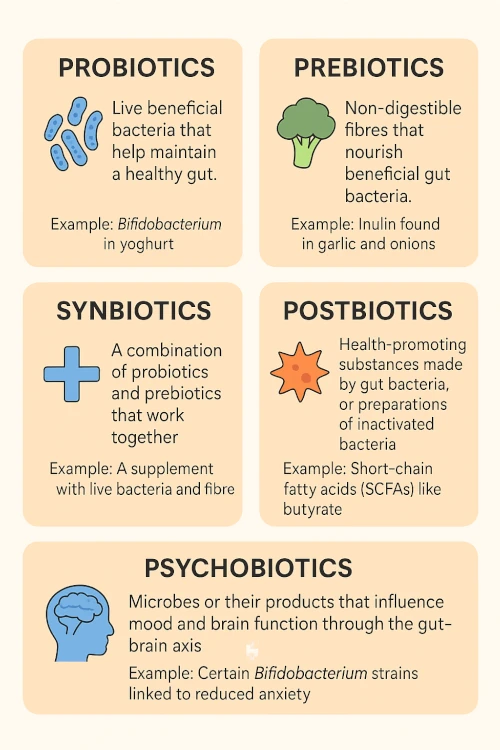Microbiome 101: Frequently Asked Questions

1. What is the gut microbiome?
Your gut microbiome is the community of trillions of microbes (bacteria, archaea, fungi, and viruses) that live in and on your body, especially in your gut. They help you digest food, make vitamins, train your immune system, and keep harmful microbes in check.
2. Are there other microbiomes?
Yes! You have different microbiomes in your gut, skin, mouth, lungs, and reproductive tract.
Microbes also live in the soil, oceans, and on plants—playing vital roles in farming, ecosystems, and even human health.
3. How does the gut microbiome affect your health?
- Digestion: Breaks down fibre, produces helpful compounds
- Immunity: Trains your immune system and fights off harmful bacteria
- Metabolism: Makes vitamins, supports blood sugar and cholesterol control
- Protection: Maintains the gut lining and keeps pathogens out
- Mental Health: Affects mood and brain function through the “gut-brain axis”
4. How can you support a healthy gut?
- Eat more plants (fruits, vegetables, whole grains, legumes)
- Include fermented foods (yogurt, kefir, kimchi, miso)
- Limit ultra-processed foods and unnecessary antibiotics
- Stay active, sleep well, and manage stress
- Avoid smoking and excessive alcohol
Small, consistent changes make a big difference.
5. Should we all be eating 20-30 types of fruit and vegetables per week?
Yes, if possible! Aiming for 30 different plant-based foods weekly (including fruit, veg, nuts, grains, and legumes) helps feed a diverse and healthy gut microbiome.
6. Tell me more about Fermented Foods?
Foods like sauerkraut, kefir, kombucha, and kimchi are naturally full of beneficial microbes. They can help increase the diversity of your gut bacteria and support digestion and immunity.
Fermented foods are part of traditional diets around the world, and they’re surprisingly easy to make at home.

7. What is the role of bacteria, probiotics, prebiotics, postbiotics, psychobiotics and synbiotics in the microbiome?
Scientists are learning how different tools—like probiotics, prebiotics, and others—can support a healthier gut and, in turn, improve overall health.
- Probiotics are live, “friendly” bacteria found in foods or supplements that help restore balance in the gut. They can crowd out harmful microbes and support the body's natural defences.
- Prebiotics are types of fibre or nutrients that feed these good bacteria, helping them grow and thrive.
- Postbiotics are the helpful substances that probiotics produce—like vitamins and short-chain fatty acids—which can reduce inflammation and support gut and immune health.
- Psychobiotics are a special type of probiotic that may help with mental health. These bacteria can produce brain-signalling chemicals like serotonin, influencing mood and stress levels through what’s known as the gut-brain axis.
- Synbiotics combine probiotics and prebiotics to work together, boosting the effectiveness of both. They help shape a healthier gut environment and support the beneficial bacteria already living there.
Together, these tools show real promise—not just for gut health, but as potential treatments for a wide range of conditions, from digestive disorders to mental health challenges. Research in this area is growing fast and could help reshape the future of medicine.
8. What diseases or health conditions does the microbiome impact?
There is evidence linking the gut microbiome to:
- Irritable bowel syndrome (IBS)
- Inflammatory bowel disease (Crohn’s, ulcerative colitis)
- Type 2 diabetes
- Obesity
- Infant allergies and eczema
- Certain infections (like C. difficile)
- Certain drug efficacies
The evidence is growing, but not every link is fully understood yet.
9. What is the gut-brain axis?
Your gut and brain are connected. Microbes in your gut make chemicals (like serotonin) and send signals to the brain through nerves and the immune system. This link plays a role in mood, stress, and brain health.
Research suggests gut microbes may be connected to conditions like anxiety, autism, and Parkinson’s disease.
10. What is the role of the microbiome in Antimicrobial Resistance (AMR)?
Antibiotic overuse can wipe out helpful microbes and allow resistant bacteria to grow. A healthy gut microbiome may help prevent this.
Promising strategies include:
- Using probiotics, prebiotics, and even faecal transplants
- Phage therapy (using viruses that target harmful bacteria)
- Smarter antibiotic use and stewardship programs
11. What are phages, and why do they matter?
Phages are viruses that infect bacteria. In the gut, they shape which microbes thrive. They could be used in medicine to target bad bacteria, and in food to keep it fresh longer and reduce waste.
12. How does the microbiome change across life?
Your microbiome is shaped from birth and continues to evolve with age.
- In early life, birth method, breastfeeding, and diet help build a diverse microbiome that supports immunity, digestion, and brain development.
- As we age, microbial diversity often declines, which can impact inflammation, immunity, and overall health.
Looking after your microbiome at every stage of life can support long-term wellbeing.


